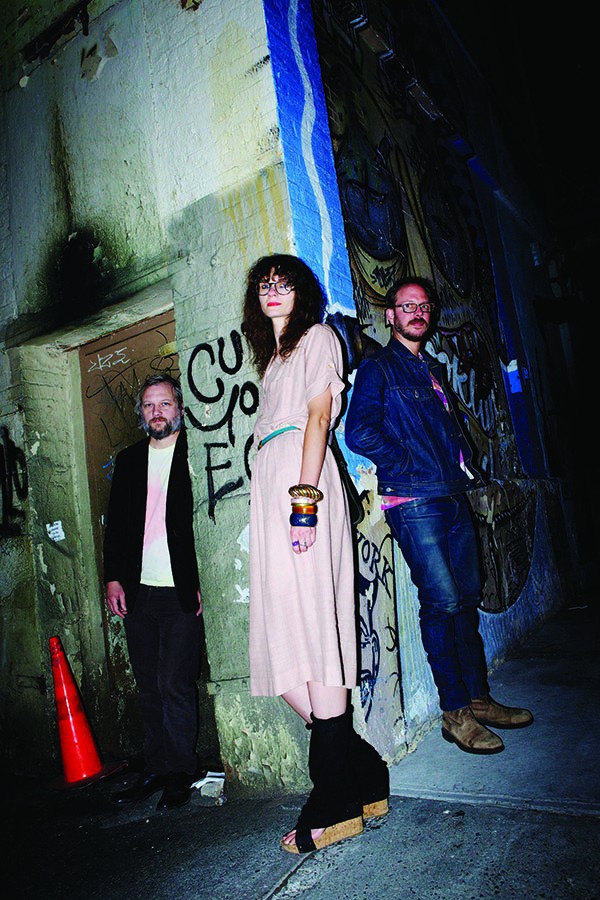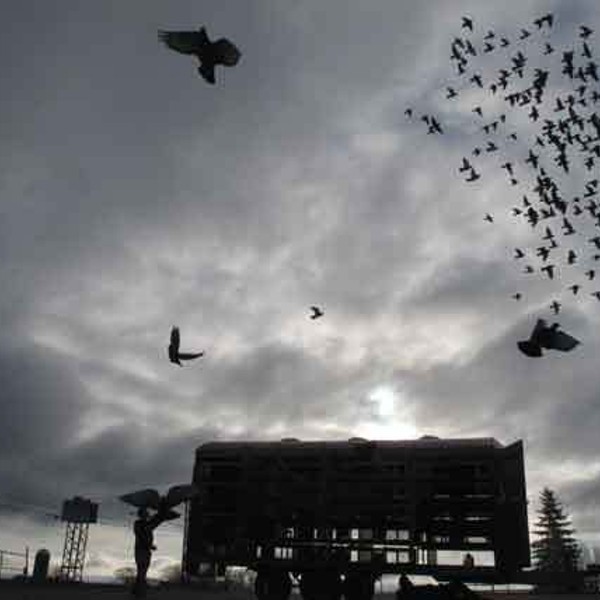The words are blurred. They float into range and hang there for a few tantalizing moments, wrapped in ghostly reverb, hinting at the distant thought of revealing themselves. But they never do. Not fully, at least. Instead, they dissolve like melting film amid dreamily strummed acoustic guitar, faraway flute, and fuzzy, single-string leads. The concept that these words were written, sung, and then intentionally masked with effects by someone who's a French-language teacher with a degree in poetics might strike some listeners as rather strange.
"Poetry in itself is a kind of masking," says singer, guitarist/multi-instrumentalist, and lyricist Wednesday Knudsen, who with her partner, bassist and guitarist Clark Griffin, forms the core of the experimental psych-folk band Pigeons. "In that way, there's a theatrical aspect to it. With us coming into rock from a bit of a noise-and-free jazz background, I guess our view of how we produce the vocals is 'Make of it what you will.'"
Knudsen grew up in Bergen County, New Jersey, an area she describes with one word: "Awful. My dad passed away when I was one. But we still had his record collection, and I remember really liking Surrealistic Pillow by Jefferson Airplane and the Beatles' Abbey Road." In high school, she studied theater and dance and was even a drum major during her freshman and sophomore years. "Then I read Jack Kerouac and things started to change," recalls Knudsen, whose mother was disappointed at the time about her daughter's lessened interest in baton twirling. "She was, like, 'But you worked so hard for this!' [Laughs.]" She took up the saxophone in her teens, inspired by Stan Getz and early John Coltrane. Griffin originally hails from Pensacola, Florida. "Pensacola was cool," he says. "My family was also pretty straight. No one else was a musician or even a big music fan. But there was a good music scene there. For punk rock, especially." The bassist and guitarist attended the University of Connecticut, where he studied philosophy before moving to New York.
The couple met in Seattle in 2001, at the bakery they both worked at while each was emerging from a romantic breakup. Griffin had moved to the Northwestern city while in a previous relationship and Knudsen was there for college. Besides connecting on a personal level, they bonded artistically as well. "Clark got me into free jazz—Sonny Sharrock, Frank Wright, Albert Ayler—and we started playing music together," Knudsen says. She and Griffin cofounded the Sea Donkeys, a group with a fluctuating lineup (members included Sir Richard Bishop and Charlie Gocher of underground legends the Sun City Girls) that released two albums and a handful of limited-edition cassettes. Griffin accurately describes the project as "pretty weird. Really freaky, noisy stuff."
In 2004, Knudsen's grad school studies brought her and Griffin back east to Astoria, Queens, and the two linked up with free-improv collective the No-Neck Blues Band. Also known as NNCK, the eclectic, seven-member outfit began in 1992 and was a central influence on the anything-goes, experimental "freak folk" wave of the early 2000s (Sunburned Hand of the Man are noted devotees). The activity around the group's Hint House loft in Harlem remains legendary, although the space was eventually eradicated by Columbia University's ongoing absorption of the neighborhood. Against this creative backdrop, Pigeons formed almost immediately, making their live debut in 2005. "I played sax and Clark played the drums, using socks that were filled with beans," says Knudsen. "We decided to call the band Pigeons because at that point we were doing this really annoying, unstructured music and we wanted a name that we thought would be annoying, too." Along with another relocation by the couple, to the Bushwick neighborhood of Brooklyn, came a move toward—gasp—structured songs, some of them even with pop and folk elements, albeit strangely unsettling elements. "The No-Neck guys were always turning us on to great rock 'n' roll we hadn't heard, or psychedelic folk stuff like [guitarist] Robbie Basho," Griffin recalls. "I'd been in a rock 'n' roll band in college, but it had been a while since I'd been in a band that did songs. And Wednesday never had. So, like she says, we were coming at [playing rock] from a different place than most rock bands do." In 2007, the two were forced to move once again, this time to the Bronx. Knudsen, in another act of striving to make the music different, began playing electric guitar, and credits her tenure as a saxophonist and flutist with her non-chord-reliant style on the stringed instrument.
Knudsen's other career as a French teacher has likewise informed Pigeons' music. The band's 2008 debut, Virgin Spectacle (Black Dirt Records), is sung entirely in the Gallic tongue, and French lyrics pepper their subsequent records of trippy, lo-fi psychedelia—an element that no doubt served the duo well during the Parisian residence they did around the release of 2010's Si Faustine (Olde English Spelling Bee Records). That year also saw the appearance of the even-dreamier-sounding Liasons (Soft Abuse Records), which features a sublime version of Serge Gainsbourg's "Laisse Tomber Les Filles." With 2011's noticeably edgier Thy Sweetheartstammers (Soft Abuse), it looked like the act had at last locked in a rhythm section with the permanent addition of prior contributor Jason Meagher (No-Neck Blues Band) on bass and Nathan Bowles (Pelt) on drums—until both left to join guitarist Steve Gunn's band. By that time, though, Knudsen and Griffin were ready to move on themselves, yet again.
In 2012, they purchased a rustic, tree-shrouded house in the Eastern Columbia County town of Austerlitz. Serendipitously, the place had once belonged to Phil Moore, an unheralded musician and composer who led the 1940s jazz/proto-R&B quartet the Phil Moore Four; arranged music for Lena Horne, Tommy Dorsey, and Harry James; and served as Marilyn Monroe's vocal coach. Griffin and Knudsen have certainly proven to be the property's perfect musical heirs, filling every corner of the living room with stacks of LPs and making another room into a rehearsal space. After their being holed up in the Bronx for the last few years, one guesses that such an environmental shift would likely have impacted Pigeons' music along the way. "Oh, definitely," Knudsen says, pointing to the group's new album, The Bower (MIE Music), which features Griffin on bass and new drummer Rob Smith (also of New York trio Rhyton). "We wrote a whole bunch of new songs that reflect this sort of sylvan atmosphere."
Recorded in the rehearsal room by engineer Mike Fellows (of 1980s DC hardcore icons Rites of Spring), The Bower bears hints of a newfound comparative tightness that belies the rambling open-endedness of Pigeons' earlier efforts. It's clear in the crisp pop of "Not a Party," which vamps on churchy piano chords laid down by Knudsen. Which isn't to say the band's trademark weirdness isn't still firmly in place: Just check the off-kilter, Television-esque, Middle Eastern guitar figure in "Foxglove," or the foggy haze of "Two Years on Land." "Wednesday writes the lyrics and comes up with most of the arrangements," explains Griffin. "The simple, 'groovier' songs are usually mine."
"Pigeons are in possession of a very specific set of sounds that they keep manipulating, subtly or otherwise," says Mike McGonigal, music editor of the Detroit Metro Times and the publisher of YETI magazine. "They've fully gone beyond any talk of influences to become their own thing, now."
At the time of our patio sit-down (over a delicious meal prepared by Knudsen) the band is resting up after a recent US tour in support of The Bower. For the group's vocalist, however, "resting up" is a relative term; she's currently embroiled in researching and writing a 300-page paper on avant-gardist Antonin Artaud and symbolist poet Stéphane Mallarmé, whose creations continue to mystify and inspire decades after their deaths. Perhaps 100 years from now some grad student somewhere will be writing a paper on her band.
"I hope people who hear our records get the same feeling we get when we listen to a record by Fred Neil or one of our other favorite musicians," says Knudsen. "Someone wrote us online last week and told us how great one of our records sounded when they played it on a rainy afternoon. We couldn't ask for a better compliment than that."
The Bower is out now on MIE Music. Pigeonsband.com.

















